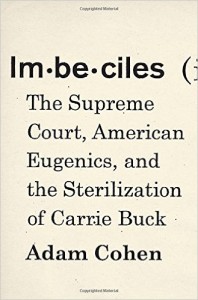1924 Immigration Law & Anne Frank
February 27, 2016‘NPR’s Robert Siegel discusses Adam Cohen’s new book telling the story of the 1927 Supreme Court case Buck v. Bell, the ruling permitted the state of Virginia to sterilize an ‘imbecile’ – – a scientific term of the day.’
—
How many people, ultimately, in the U.S. do we think were sterilized under cover of such laws?
Well, we think about 70,000, which is an extraordinary number. But then, an untold number of other people were just taken away, as Carrie Buck and her mother had been, and kept in colonies so that they couldn’t reproduce. And that’s another kind of punishment that eugenics inflicted on a large number of Americans. You know, there’s one other group that, you know, was very terribly harmed, which is all the people who would’ve immigrated to America but for the 1924 immigration law that was enacted for eugenic reasons. And this intentionally shut off immigration of Jews, Italians and Asians, who were thought to be genetically less gifted, and prevented a lot of Jews from fleeing Nazi Germany. And as we know, some letters came to light some years ago in which Otto Frank wrote to the State Department trying to get visas for his family, including his daughter, Anne Frank. And they were turned down because of this 1924 law. So it’s interesting that when we tell the story of Anne Frank we think that, you know, she died in [Bergen-Belsen] because the Nazis thought that Jews were inferior. But to some extent, she also died in [Bergen-Belsen] because the American Congress thought that Jews and other people like that were inferior and closed the door to them.
http://www.npr.org/2016/02/26/468297940/imbeciles-explores-legacy-of-eugenics-in-america
Voices of compassion.
During a political season laden with polarized vitriol and hateful rhetoric, ‘voices of compassion’ is a reminder of the human heart and the kind thoughts and gestures that bring light to the shadows in life.
Two stories: One of harbored guilt and responsibility for a tragic event in our nation’s history; the other from a man who continues to immerse himself in the studies of addiction to help those caught in a system without support, or care.
NPR
“That was one of the mistakes God made,” Bob Ebeling, now 89, told me three weeks ago at his home in Brigham City, Utah. “He shouldn’t have picked me for that job. But next time I talk to him, I’m gonna ask him, ‘Why me? You picked a loser.’ ”
Jim Sides listened to the NPR story in his car in Jacksonville, N.C.
Other’s listened to this story as well, were touched deeply, and reached out to Bob to offer kindness and encouragement. Here’s a link to their story from All Things Considered.
—
‘It’s a tough sell on two sides. No. 1, it’s a tough sell for people who suffer from addiction. It’s tough to hear, “I’m sorry, we don’t have a cure. You can’t get detoxed, go away for 30 days, get your head straight and not be affected.” Same is true for diabetes. There is no place that I know of that gives you 30 days of insulin treatment and a hearty handshake and sends you off to a church basement. It just won’t work, so that’s tough.’
For researcher A. Thomas McLellan, who has spent his entire career studying substance abuse, the shift is a welcome one, though it has come frustratingly late.
McLellan is co-founder of the Treatment Research Institute in Philadelphia and former deputy director of the White House Office of National Drug Control Policy. His work has focused on understanding addiction as a disease and improving the ways it is treated, a mission that took a personal turn midway through his career when he lost a son to overdose.’

